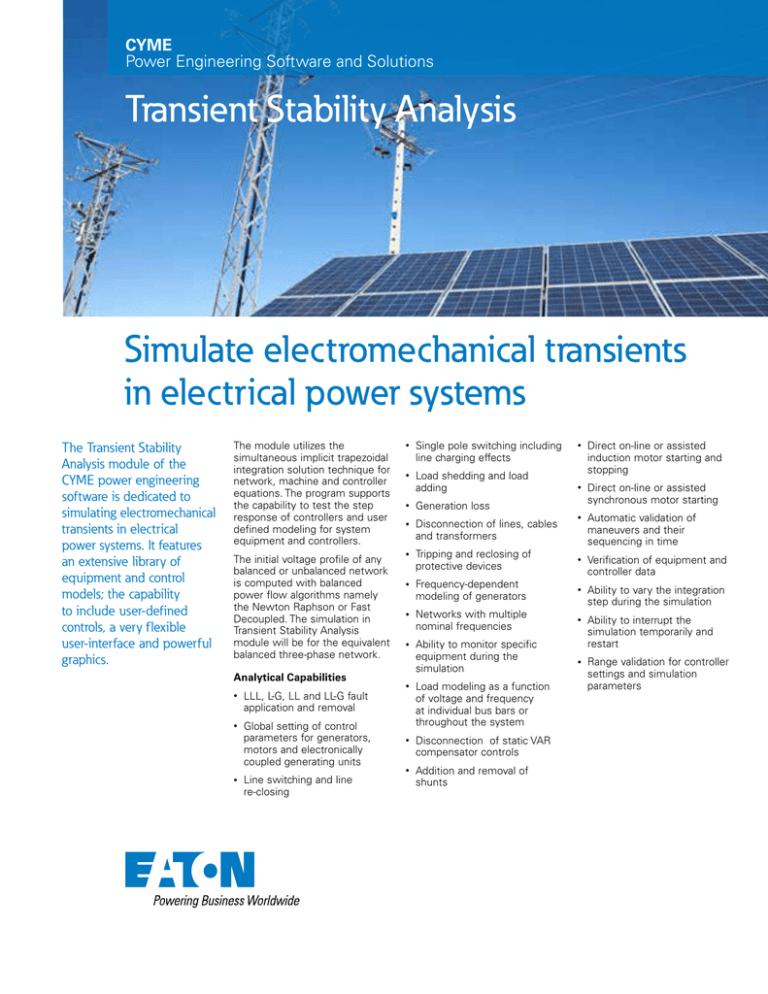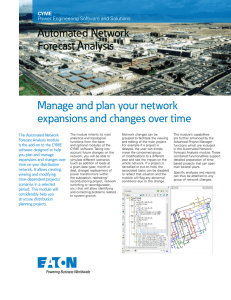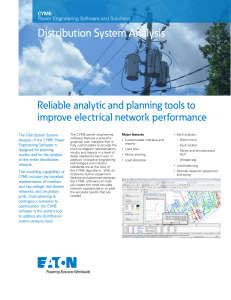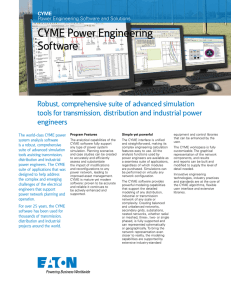
CYME
Power Engineering Software and Solutions
Transient Stability Analysis
Simulate electromechanical transients
in electrical power systems
The Transient Stability
Analysis module of the
CYME power engineering
software is dedicated to
simulating electromechanical
transients in electrical
power systems. It features
an extensive library of
equipment and control
models; the capability
to include user-defined
controls, a very flexible
user-interface and powerful
graphics.
The module utilizes the
simultaneous implicit trapezoidal
integration solution technique for
network, machine and controller
equations. The program supports
the capability to test the step
response of controllers and user
defined modeling for system
equipment and controllers.
•
Single pole switching including
line charging effects
•
Load shedding and load
adding
The initial voltage profile of any
balanced or unbalanced network
is computed with balanced
power flow algorithms namely
the Newton Raphson or Fast
Decoupled. The simulation in
Transient Stability Analysis
module will be for the equivalent
balanced three-phase network.
Analytical Capabilities
•
LLL, L-G, LL and LL-G fault
application and removal
•
Global setting of control
parameters for generators,
motors and electronically
coupled generating units
•
Line switching and line
re-closing
•
Direct on-line or assisted
induction motor starting and
stopping
•
Direct on-line or assisted
synchronous motor starting
•
Automatic validation of
maneuvers and their
sequencing in time
•
Generation loss
•
Disconnection of lines, cables
and transformers
•
Tripping and reclosing of
protective devices
•
•
Frequency-dependent
modeling of generators
Verification of equipment and
controller data
•
•
Networks with multiple
nominal frequencies
Ability to vary the integration
step during the simulation
•
•
Ability to monitor specific
equipment during the
simulation
Ability to interrupt the
simulation temporarily and
restart
•
Range validation for controller
settings and simulation
parameters
•
Load modeling as a function
of voltage and frequency
at individual bus bars or
throughout the system
•
Disconnection of static VAR
compensator controls
•
Addition and removal of
shunts
Transient
Stability
Analysis
Control Model Library
User-Defined Modeling
The control model library of
the Transient Stability Analysis
module is an extensive library of
dynamic models of equipment
and their controls. This includes
default data values of the
parameters, their description and
block diagrams as per published
transactions and papers.
The Transient Stability Analysis
module features a unique ability
to supplement the existing array
of control models for system
equipment and controllers,
giving the user the opportunity
to model any desired control
system using user-defined
modeling.
Simulate electromechanical
transients in electrical power
systems.
This includes control models of:
The user-defined modeling
approach is based on the
premise of solving the
user-defined equations. The
program is provided with an
extensive library of elementary
functions and building block
controls to model any control
scheme, including system-wide
operations.
•
Round poles and salient poles
generators
•
Modeling of excitation
systems taking saturation
into account, based on IEEE®
standards
•
Power system stabilizers
•
Governor models comprising
hydraulic, thermal, diesel, and
gas turbines
•
Detailed modeling of staticVAR compensators
•
Under-voltage, underfrequency, frequency droop
relays and over current relay
modeling
•
Impedance relay with typical
circular trip characteristics
including single reset time
reclosing
•
Induction motor models
with frequency dependent
modeling
•
Dynamic modeling of
distributed generation such
as Wind Energy Conversion
Systems (WECS), photovoltaic
(PV cells), fuel cells and micro
turbines
The model can be created with
a simple text editor and there
is no need to recompile the
software to integrate the new
model into the library.
The control model library is so
flexible in its design that the
user can create or import into
the library any control model
created with the built-in user
defined modeling functions.
This includes any model created
previously for the PSAF software
or any new one that the user
may wish to add to the CYME
software library in order to
include it in any study requiring
such model. In addition the
user can import dynamic model
block diagrams in bitmap image
format.
Dynamic Modeling of
Distributed Energy Resources
The Transient Stability Analysis
module includes extensive
modeling capability of
Distributed Energy Resources
(DER) equipment such as Wind
Energy Conversion Systems
(WECS), photovoltaic, fuel cell
and micro turbine dynamics.
The advanced solution
algorithms provide the user
with the necessary tools to
carry out power system studies
comprised of these types of
installations.
Eaton
1000 Eaton Boulevard
Cleveland, OH 44122
United States
Eaton.com
CYME International T&D
1485 Roberval, Suite 104
St.Bruno, QC, Canada J3V 3P8
P: 450.461.3655 F: 450.461.0966
P: 800.361.3627 (Canada/USA)
CymeInfo@eaton.com
www.eaton.com/cyme
© 2015 Eaton All Rights Reserved
Printed in Canada
Publication No. BR 917 015 EN
December 2014
Eaton is a registered trademark.
All other trademarks are property
of their respective owners.
Follow us on social media to get the
latest product and support information.





